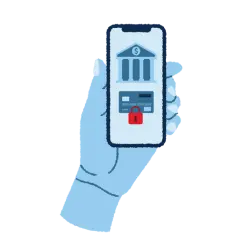Let’s take a close look at Bank of America chargebacks and how they affect merchants! If you own a business, you’re probably familiar with chargebacks and how troublesome they can be. Customers often file chargebacks for genuine reasons, but there are times when you’ll need to challenge illegitimate chargebacks. If they are not handled on time, chargebacks can lead to fraud, a high chargeback ratio, or additional out-of-pocket fees for you.
Luckily, every merchant has the option to fight a chargeback and ultimately win the dispute. In this article, we detail how to deal with Bank of America chargebacks, the process from start to finish, and the costs associated with them.

What Is a Bank of America Return Item Chargeback?
If you’ve had a customer file a chargeback using a Bank of America credit card, you’ve experienced a Bank of America chargeback. There’s a popular misconception that chargebacks and refunds are the same things, and that’s not the case. A chargeback happens when a cardholder asks their bank to reverse a charge. A refund, on the other hand, occurs when a customer asks a merchant for a refund, and the merchant willingly credits their account.
Bank of America’s Chargeback Process for Merchants
Bank of America advises its clients to contact the merchant before disputing a charge. If the merchant and customer can’t agree on a refund, the customer may request a chargeback. At that point, Bank of America notifies the merchant’s acquiring bank about the chargeback, which then forwards the notice to you as the merchant.
In choosing to fight the chargeback, you’ll need to provide sufficient evidence to win the dispute. Afterward, Bank of America reviews the evidence and either reverses or sustains the chargeback. In the meantime, the cardholder receives a temporary credit for the amount of the transaction.
If the bank accepts a chargeback, the merchant sees a deduction of the funds and an additional chargeback fee from their account. Also, the temporary credit given to the cardholder becomes permanent.
Bank of America claims processing time
Bank of America’s refund time is calculated after you present your evidence to the bank. Once you do, the bank decides within 30 days for Visa chargebacks and 45 days for Mastercard chargebacks. For customers, Bank of America states that they decide on chargeback cases within two billing cycles but no more than 90 days.
Bank of America Chargeback Time Limits
At Bank of America, customers can dispute a transaction within 60 days of the purchase. The time limit to respond to a dispute for merchants depends on the associated credit card network. Merchants must respond and provide evidence within 30 days for Visa transactions and 45 days for Mastercard transactions.
Do Merchants Pay a Bank of America Chargeback Fee?
Each disputed charge at Bank of America is subject to a chargeback fee from $25 to $50. In most cases, merchant agreements specify how much a merchant owes for chargebacks, and this varies based on the industry, business type, and risk assessment. Regardless, Bank of America requires merchants to pay the fee immediately upon initiating a chargeback.
If either party is dissatisfied with the decision of the chargeback, one of them may choose to go to arbitration, in which case the associated card network decides the outcome. The losing party is subject to additional arbitration fees, which may reach up to $500. It’s also worth mentioning that you cannot appeal a card network’s final verdict, so before challenging a chargeback, make sure that it wasn’t your fault.
How to Deal with Bank of America Credit Card Disputes
There are different stages within the chargeback process. The “second presentment,” also known as representment, is the stage where you can fight the chargeback dispute. As soon as you receive a chargeback, you should submit a rebuttal letter and supporting evidence to prove you aren’t at fault.
If you discover the reason for the dispute, you might be able to prevent the chargeback from escalating. You may want to use the situation to improve business operations and customer satisfaction in the future. Additionally, consider utilizing authorization holds to delay the completion of the transaction in case the customer asks for a refund.
As a last resort, it’s best to enlist the help of an expert team to manage chargebacks so that you can maximize your chances of success. Therefore, you won’t have to worry about wasting your time dealing with pesky disputes and focus on more important matters, like your business operations.
Is it Worth it to Fight Bank of America Chargebacks?
Fighting a Bank of America chargeback can significantly lower your chargeback ratio and save your business’s reputation. Essentially, chargebacks reflect how your business practices affect your customers, so it’s best to handle them with care. By improving your return policy, advertising efforts, product quality, and customer service, you can avoid chargebacks more effectively.

Final Thoughts on Bank of America Chargebacks
No merchant enjoys dealing with chargebacks, but if you want to keep your business running smoothly, you should address them when they arise. If you suspect fraudulent behavior and you’re sure that you didn’t make the mistake, challenging them will help you establish a more reliable reputation while keeping your chargeback rate low. However, the best way to resolve chargebacks is to stop them from happening in the first place. Sign up for chargeback mitigation today to protect your business and save valuable time and money in the long run!
High-Risk Businesses Wanted
Your approval troubles are over!
Approval
Rating
Bank of America Chargeback FAQ
What is a Bank of America temporary credit adjustment?
When the bank accepts the chargeback, the funds will be deducted along with an additional chargeback fee, and an interim credit is applied to the cardholder’s account after the transaction is completed. Chargeback disputes result in permanent credit for the cardholder if they win.
What happens when a merchant loses a BOA chargeback dispute?
The lost product/service and transaction amount are not the only losses for merchants if they lose a chargeback case—there’s also the chargeback fee. If a merchant decides to go into arbitration and loses, there are additional fees.
How long does a Bank of America claim take?
To respond to a chargeback, merchants have 30 days for Visa and 45 days for Mastercard chargebacks. Bank of America strives to close a chargeback claim within 90 days, however, depending on the complexity of the case, it may take longer.






